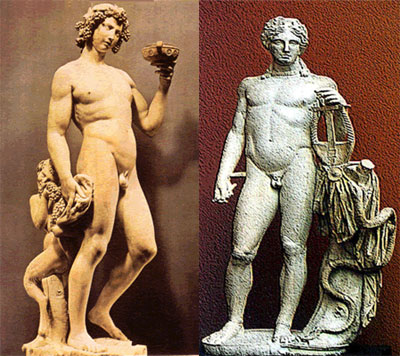 received great reverence since the times from the primitive Greeks until the Romans and, known primordially as a solar deity, also represented the Greek ideal of the young masculine beauty and was the god of this youth, helping in the transistion for the adult age. Flho de Zeus and of titã Leto, and twin brother of the goddess of the Artêmis hunting and father of Asclépio (Esculápio) and Orfeu, became the god of the sun, the light, music, the poetry, youth, the sports and the hunting and still the god of the prophecy: Mr. of all the oracles, also of Delfos, more celebrates of all the places of prophecies. Also he had its black part, when it uses the arc, to go off lethal darts that killed the men with illnesses or sudden deaths, and also considered the god of the plagues of rats and the wolves, that tormented many times the Greeks.
received great reverence since the times from the primitive Greeks until the Romans and, known primordially as a solar deity, also represented the Greek ideal of the young masculine beauty and was the god of this youth, helping in the transistion for the adult age. Flho de Zeus and of titã Leto, and twin brother of the goddess of the Artêmis hunting and father of Asclépio (Esculápio) and Orfeu, became the god of the sun, the light, music, the poetry, youth, the sports and the hunting and still the god of the prophecy: Mr. of all the oracles, also of Delfos, more celebrates of all the places of prophecies. Also he had its black part, when it uses the arc, to go off lethal darts that killed the men with illnesses or sudden deaths, and also considered the god of the plagues of rats and the wolves, that tormented many times the Greeks.After having dead the Pitho serpent that frightened the people, in commemoration to this exploit, it he instituted the Pithios Games, whose winner in the competitions of force, speed or race of covered carts was crowned with a parrot crown. Founder of cities, gave good laws, was a pure god and just and that he cured the sick people, venerated together with this in great temple-hospitals, where if some illnesses cured, over all through sleep. Pará (Fauno), that it had invented the gaita, defied it for a musical competition that had to touch the lira, and although the beautiful music touched for Pará (Fauno or Silvano), touching the lira that gained as a gift of Hermes, the song its was so impressive that immediately it was declared winning.
All had agreed, little Midas, follower of Pará, and then the winner transformed its ears of Midas into donkey ears. Midas tried to underneath hide the ears of a great turban, but its hairdresser knew the secret and he did not obtain to keep it. Not daring to say it nobody, dug a hole in the soil, inside whispered the happened one of the hole and it covered later it. But a thick underbrush of rushes was born and if it put to whisper history from that day, each time that the wind blew on them. For spreading that it was optimum arqueiro between deuses, Eros annoyed (Cupido), the god of the love, and this were avenged going off one of its arrows in the heart of the disaffection and one another one in the heart of the Dafne nymph, son of the god-river, Pineus.
The god soon got passionate itself for Dafne that costumava to walk for the forests and, as Ártemis, the goddess of the hunting, did not want to be married. It pursued it, but it refused itself to stop and was flying, followed for it, determined in apanhar it. Tired and you give to fall in the soil, Dafne called its father, the god-river, to save it. Into the accurate moment where it went to be apanhada, Dafne was converted into a parrot foot (Dafne, in Greek, means parrot). Without being able to marry the loved one and for loving it in such a way, it decided that the crowns that would be used to distinguish the heads from the winners of the Typical Games would have to be made with parrot twigs. He took partico in the famous war of Troy, defending this city, decimating the aqueus with plague when these had offended its troiano priest, and finishing for killing Aquiles. At more delayed time she was identified with Hélios, god of the sun, therefore he was before the god of the light, and by haul its sister was identified with the Selene goddess, of the moon. Mitologicamente was a god of innumerable loves, but that never it had luck, for revenge of Eros, god of the love. In Etruscan mythology, it was known as Aplu and he was venerated in Cyprus, with the heading of Abeu.



No comments:
Post a Comment
Note: Only a member of this blog may post a comment.